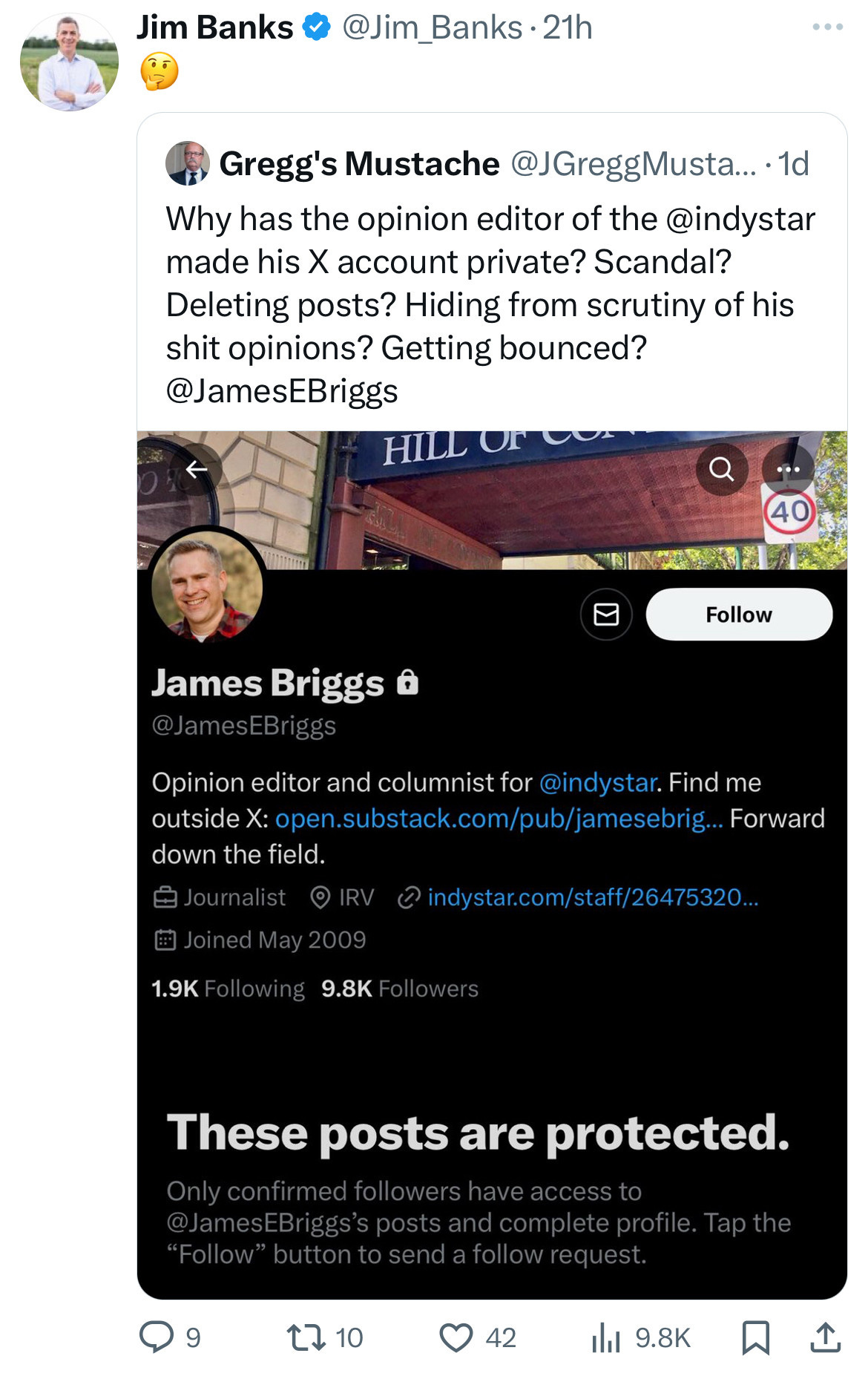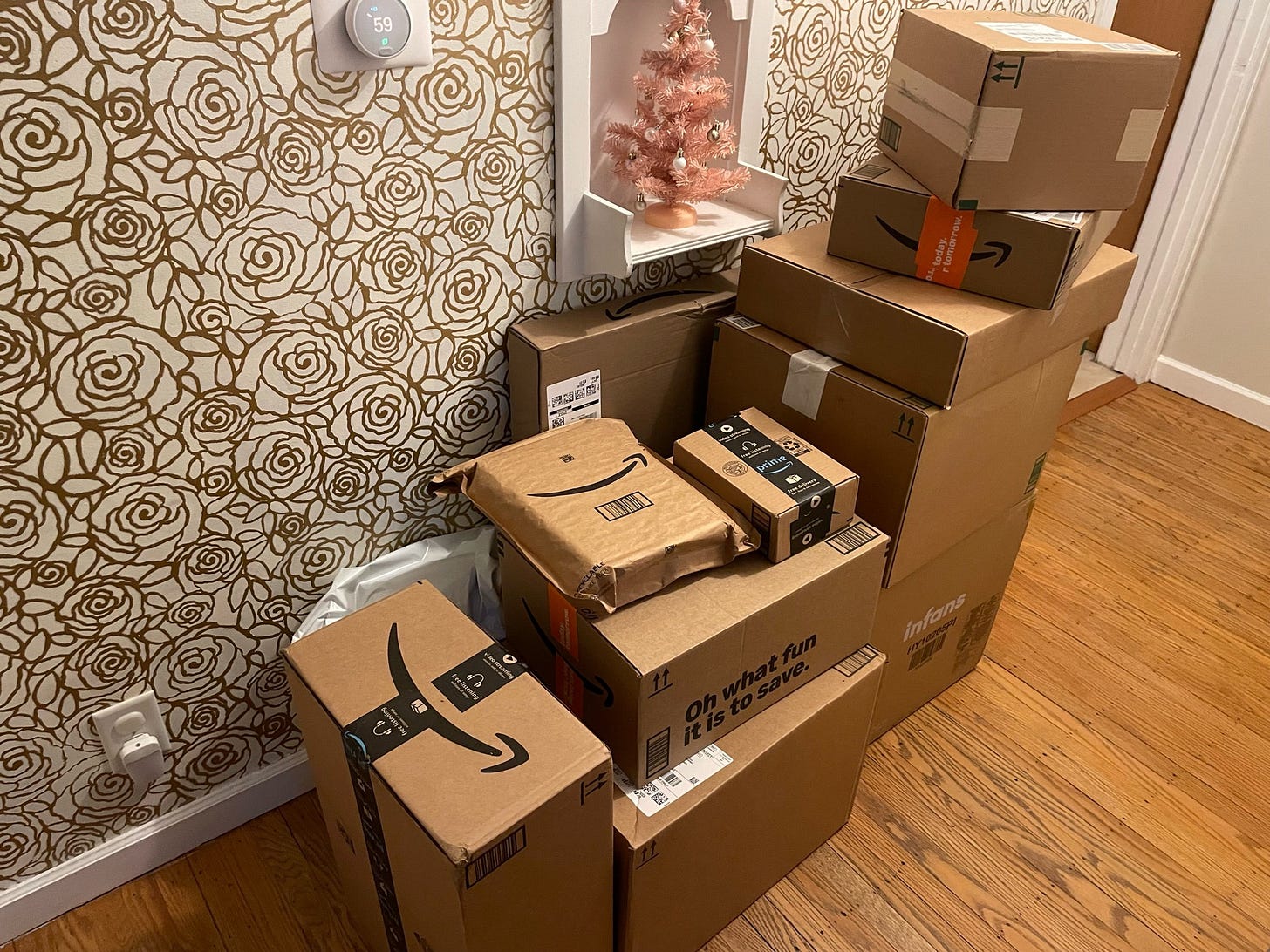Ignore the news
It's OK to log off, especially if you're Jim Banks.
Last year, my family caved to the Santa industrial complex, as I wrote for Axios. This week, we waited in a 90-minute line so our tired, hungry children could see the jolly old elf.
It’s the most wonderful time of the year.
1. You don’t have to care about everything

Since you’re reading this newsletter, you’re probably an above average consumer of news. That’s great.
Until it isn’t.
The onset of a second Trump administration is already escalating the supply of important-sounding news. Attention fatigue is back.
Consider this week’s minute-by-minute news on whether the federal government would shut down. Congress averted a shutdown overnight, an outcome that would have occurred regardless of whether you spent time reading multiple articles about the process.
Chances are, a government shutdown wouldn’t have affected you anyway. You can pay attention to news like that, if you want to, but you have no patriotic duty to do so. It’s OK to tune out stories you don’t care about.
I’ve been practicing this myself lately. I’ve refused to engage with news cycles on drones or Daniel Penny, to cite a couple examples. I vaguely know what those stories are about and I don’t care to learn more. I’m giving myself permission to ignore the news.
As I was thinking through this post, Charles M. Blow wrote a column for The New York Times encouraging even the most engaged progressive activists to take a break from churn.
He writes:
Should anyone feel guilt for choosing not to constantly ruminate or pre-emptively panic? For choosing to take a breath and a beat before re-engaging in the fight — against the denigration of women and minorities, for individual liberty and bodily autonomy, against cruelty and for democracy itself — that is almost surely in the offing once Donald Trump returns to power?
Absolutely not.
First, taking time to lick wounds speeds their healing. Second, outrage is expensive. It consumes a tremendous amount of fuel, which at some point must be replenished. We do so by taking breaks to sit in solitude, to touch grass, to be truly present with loved ones and to clarify our purpose.
I set boundaries for my own consumption during the first Trump term, a boom time for the news business when it seemed like major outlets were publishing must-read, 5,000-word articles on an hourly basis.
Here are some changes I made:
I stopped watching Sunday news shows. I used to watch more than one show each Sunday. At some point, I realized I didn’t enjoy them and they didn’t improve my understanding of … anything.
I fell in love with Axios. It’s no coincidence that I went to work there in 2022. I gravitated to the product because, as the company mission professes, it gave me the information I needed to feel informed while also saving me the time I might otherwise have spent reading the aforementioned 5,000-word articles.
I stopped taking sides on everything. That might sound weird coming from an opinion columnist. I have plenty of opinions. But I haven’t thought about most news topics enough to have well considered views. I used to manufacture opinions, anyway, in order to try to sound smart or post takes to social media. I can’t say I never do that now, but I try to recognize the difference between issues that matter to me and ones I should sit out.
I work in news, of course. I realize I’m essentially encouraging you to skip reading my work. But maybe you should! Whenever someone emails to tell me what a waste of time one of my columns was for them, I encourage them to ignore me in the future because life is too short to spend it reading content that makes your day worse.
At the same time, you shouldn’t feel bad about consuming news you enjoy. I follow a wide range of stories, from serious to frivolous. There’s nothing wrong with following weird drone news if that’s a topic of genuine interest.
As news takes on a more urgent (and, unfortunately for my industry, self-important) tone, it’s worth noticing which stories add value for you, either because they offer useful knowledge or entertainment, and making decisions accordingly.
For me, the government shutdown tick-tock was a reminder of the noise I tried to tune out during the first Trump administration. It’s only going to get louder.
2. Jim Banks should probably log off
I didn’t think it was a big deal when I set my Twitter/X account to private.
I’ve grown tired of the platform boosting troll accounts into my timeline and mentions, while also throttling links I share. I, along with many other people, am experiencing diminishing returns for the time I invest in X.
So, I locked my account, while also keeping access open to the nearly 10,000 accounts that have followed me in the past 15 years. Who cares, right?
Well, dear reader, my X account is apparently a matter that warrants the attention of U.S. Sen.-elect Jim Banks.
I was out with my children last weekend when someone alerted me to Banks sharing a post from an anonymous troll account questioning whether I was … trying to disappear or something? I don’t really know. It’s just honestly pathetic that a man who has scaled America’s power structure cares about my social media usage.
It’s also a little weird to know Banks is rooting for me to go down in scandalous flames. As Indiana’s Extremely Online senator-elect sells himself out for MAGA riches, I’d suggest he spend a little more time reflecting on his own integrity — and also maybe try logging off.
If you’re friends with Banks or “Gregg’s Mustache,” feel free to tell them I’ll approve their requests if they want to follow me on X, or they can sign up for my free weekly newsletter on Substack.
3. What I wrote
I published three columns this week for IndyStar:
4. What I read
Matthew Yglesias wrote an excellent piece examining the supposed decline of elites and experts. It’s behind the paywall, so I’ll give you one particularly good passage putting today’s media criticism into perspective:
Something I think about a lot is how, as a result of the internet and increased competition, media coverage writ large has never been better, but people perceive it as worse.
Imagine it’s 1987, and there’s a newspaper in Los Angeles.
That newspaper runs dozens of headlines every day. And then one Tuesday, one of those headlines is really stupid and offensive — maybe it’s anti-Christian or racist, or it’s egregiously biased against Israelis or against Palestinians.
What would happen? Well, what would happen is that nobody outside of Southern California would notice or care. Most people in Southern California wouldn’t even notice, for that matter. There might be a tempest in a local teapot, maybe some angry letters to the editor and a mocking column about it in the local alt-weekly. Maybe the paper would issue a correction (or maybe not). But everyone would go about their business.
Today, though, the bad headline would go viral. And because hundreds of thousands (if not millions) of people would see it, at least a few hundred people would decide that the bad headline was actually good. We’d have takes and counter-takes, and one of the takes would be that the bad headline exemplifies everything that’s wrong with the media.
Which is why everyone is mad at “the media” all the time. Every day there’s a headline that’s “too soft” on Trump and another that’s “too harsh.” Every so often, one of these claims is genuinely true, and the bad headline example receives widespread circulation.
5. From our warehouse to yours
Our entryway looks like a distribution center, and that can only mean one thing. It’s Christmastime!
Your gift to me is signing up for this newsletter. If you know Jim Banks or anyone else who might enjoy it, please pass it along. I hope you have a great holiday week full of wonderful moments with family!




